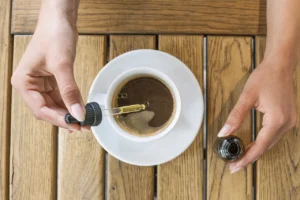Vaping has become a popular alternative to smoking over the past decade, and with it, several myths and misconceptions have emerged. One question that often pops up is, “Does vaping get you high?” It’s a common inquiry among people considering trying vaping for the first time, as well as those looking to understand the effects of e-cigarettes or vape pens on the body. In this blog post, we’ll break down the truth about vaping, its potential effects, and the difference between nicotine and THC vapes, so you can make an informed decision.
What Is Vaping?
Vaping refers to the inhalation of vapor produced by an electronic cigarette (e-cigarette) or vaporizer. These devices heat a liquid (known as e-liquid or vape juice) that typically contains a combination of nicotine, flavourings, and other chemicals. When the e-liquid is heated, it turns into a vapour that can be inhaled into the lungs, simulating the experience of smoking without the harmful chemicals found in traditional cigarettes.
However, while vaping is primarily associated with nicotine, there are other substances that can be vaped, including THC (tetrahydrocannabinol), the psychoactive compound in cannabis, and CBD (cannabidiol), which is non-psychoactive.
So, the real question here is: Does vaping get you high? Let’s explore the different types of vaping products and how they can affect your body and mind.
1. Nicotine Vapes: No, Vaping Nicotine Won’t Get You High
The vast majority of e-cigarettes and vape pens available today contain nicotine, a stimulant found in tobacco. Nicotine is not a psychoactive substance in the way that cannabis is. It doesn’t cause a “high,” but it can produce feelings of relaxation, alertness, or a slight rush, especially for those who are not regular users.
What Nicotine Vapes Do:
- Stimulate the central nervous system: Nicotine affects brain receptors, which may lead to an increase in dopamine, the “feel-good” hormone. This is why nicotine can give you a sense of pleasure or relaxation, but it’s not considered a “high.”
- Create a mild buzz or euphoria: Some users report feeling light-headed or euphoric shortly after vaping, but this is due to the stimulant effect of nicotine, not a true high.
- Addiction potential: Nicotine can be addictive. Regular use can lead to dependence, making quitting difficult for some users.
In summary, nicotine vapes do not get you high in the traditional sense. They can give you a quick energy boost or a feeling of relaxation, but the effects are not comparable to what you would experience with THC.
2. THC Vapes: Yes, Vaping THC Can Get You High
While nicotine vapes won’t get you high, THC vapes are a different story. THC is the psychoactive compound in cannabis responsible for the “high” feeling that people experience when they consume marijuana. When vaped, THC is absorbed into the bloodstream through the lungs, where it travels to the brain and binds to cannabinoid receptors, leading to the characteristic effects of being “high.”
What THC Vapes Do:
- Induce a psychoactive effect: When you vape THC, you may experience an altered state of consciousness, including euphoria, relaxation, or even heightened senses.
- Effects vary by dose: The intensity of the high can depend on the amount of THC in the vape oil and your tolerance level. New users may experience stronger effects even with a small amount of THC.
- Shorter onset time: Vaping THC delivers quicker results compared to smoking marijuana, with the effects typically felt within a few minutes of inhalation.
- Potential for adverse effects: While some people enjoy the effects of THC, others may experience anxiety, paranoia, or dizziness, especially if they consume too much. It’s important to start with a low dose if you’re new to THC.
If you’re using a vape pen or e-cigarette with THC-infused e-liquid or oil, yes, it can get you high.
3. CBD Vapes: No, Vaping CBD Does Not Get You High
Another type of vape product that has become popular is CBD vape oil. CBD (cannabidiol) is a non-psychoactive compound found in cannabis, meaning it does not produce the euphoric or “high” effects that THC does. Instead, CBD is typically used for its potential health benefits, including reducing anxiety, alleviating pain, and promoting relaxation.
What CBD Vapes Do:
- Promote relaxation: Many people use CBD vapes to help manage stress, anxiety, and sleep issues, but it won’t cause you to feel high.
- No psychoactive effects: Since CBD doesn’t bind to the brain’s cannabinoid receptors in the same way THC does, it doesn’t cause a “high.”
- Potential therapeutic benefits: Research into CBD is still ongoing, but many people report positive effects, such as reduced inflammation, pain relief, and improved mood, when using CBD products.
If you’re looking to experience the benefits of cannabis without getting high, CBD vapes may be a good choice, but they won’t give you the same effects as THC.
4. The Risks of Vaping: What You Need to Know
While vaping can be less harmful than smoking cigarettes, it is not without risks. Regardless of whether you’re using nicotine, THC, or CBD, there are health considerations to be aware of.
Health Risks of Nicotine Vaping:
- Addiction: Nicotine is highly addictive, and regular use can lead to dependence.
- Potential lung damage: There have been concerns about the long-term effects of inhaling vaporized chemicals, especially in unregulated or homemade e-liquids.
- Heart health: Nicotine can raise blood pressure and increase heart rate, putting stress on the cardiovascular system.
Health Risks of THC Vaping:
- Risk of lung injury: There have been reports of “vaping-associated lung injury” (VALI) linked to vaping THC, especially when using unregulated or illicit products.
- Legal issues: In some regions, vaping THC may be illegal, depending on local laws regarding cannabis use.
- Psychological effects: Excessive use of THC can lead to anxiety, paranoia, or cognitive impairment in some individuals.
Health Risks of CBD Vaping:
- Quality control: The CBD market is not always well-regulated, and some products may contain harmful additives or contaminants.
- Side effects: Although CBD is generally well-tolerated, some people may experience side effects like drowsiness or gastrointestinal issues.
Conclusion: Does Vaping Get You High?
The short answer is: it depends. If you’re vaping nicotine, you won’t get high in the traditional sense, though you may feel a mild rush or relaxation. If you’re vaping THC, however, you absolutely can get high, as THC is the psychoactive compound responsible for marijuana’s effects. CBD vapes, on the other hand, do not produce a high, but they may provide therapeutic benefits like relaxation and stress relief.
Ultimately, whether vaping gets you high or not depends on the substance in the vape and your individual response to it. If you’re curious about the effects, it’s always a good idea to start slow, especially with THC products, and understand the potential risks associated with vaping.
As always, it’s important to research and purchase products from reputable sources to ensure quality and safety—whether you’re using nicotine, THC, or CBD vapes. Stay informed and vape responsibly!




